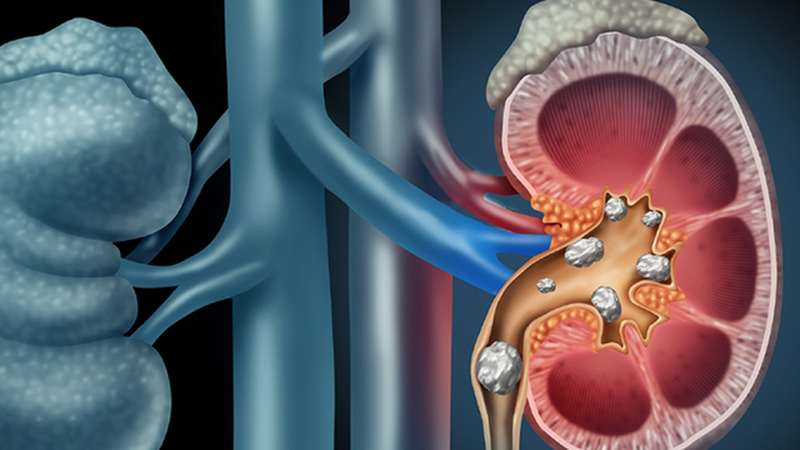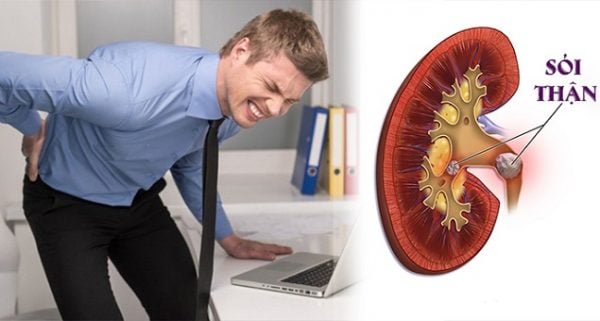Urinary tract stones are solid particles formed by the natural crystallization of inorganic crystals in urine. They can cause pain, nausea and vomiting, blood in the urine, and may cause fever and chills due to secondary infection. Most of them begin to form in the kidneys, travel along the urinary tract, and are excreted, which is why many people commonly refer to them as kidney stones.

Kidney stones are a common urinary tract infection in middle-aged men.
Symptoms of kidney stones
- Symptoms of kidney stones
- People at risk of developing kidney stones
- Ways to prevent kidney stones
Symptoms of kidney stones may include:
Back pain, pain in the lower flank area due to friction or urinary retention, leading to symptoms of pain in the back, which may radiate to the lower abdomen, flanks, and thighs.
Pain during urination can be caused by kidney stones moving from the ureter to the bladder or from the bladder to the urethra, resulting in pain or even burning sensations during urination.
Hematuria (blood in the urine) is caused by the friction of stones as they move towards lesions. However, depending on the type of lesion, hematuria may be visible to the naked eye or require microscopic observation.
Frequent urination, urinary incontinence. When stones are in the ureter or bladder, patients will feel the urge to urinate and will urinate very often.
Nausea and vomiting can occur when kidney stones affect the digestive tract, leading to feelings of nausea and vomiting.
Fever and chills associated with kidney stones can easily lead to urinary tract infections.
Kidney stones have many recognizable signs and symptoms. If you experience any of these symptoms, you should see a doctor promptly for timely treatment to avoid serious consequences.

Men have a more complex urinary tract structure, making it more difficult for kidney stones to pass naturally compared to women.
People at risk of developing kidney stones
When someone in the family carries this gene, there is a higher risk of developing kidney stones.
People living in tropical climates who don't drink enough water and sweat excessively often become dehydrated.
People who consume too much protein, salt, or sugar.
Obese people.
People who have undergone surgery or are using certain medications are at a higher risk of developing kidney stones.
Ways to prevent kidney stones
To prevent the risk of developing kidney stones, you should:
Diet:
- Reduce sodium intake in your diet.
- Reduce the amount of sugar in your meals.
- Limit red meat consumption and supplement your protein intake with poultry.
- Avoid sugary drinks and soft drinks.
- Avoid processed foods such as bread, french fries, and cheeses.
- Limit foods high in calcium and foods with relatively high oxalic acid content such as apples, garlic, onions, coffee, cocoa, and tea. Avoid alcohol and coffee.
Practice:
Maintaining a regular exercise routine, such as walking or cycling, is important for good health and to eliminate disease risks.
Source: https://suckhoedoisong.vn/dau-lung-tieu-son-de-phong-soi-than-169251128185301115.htm













































































































Comment (0)